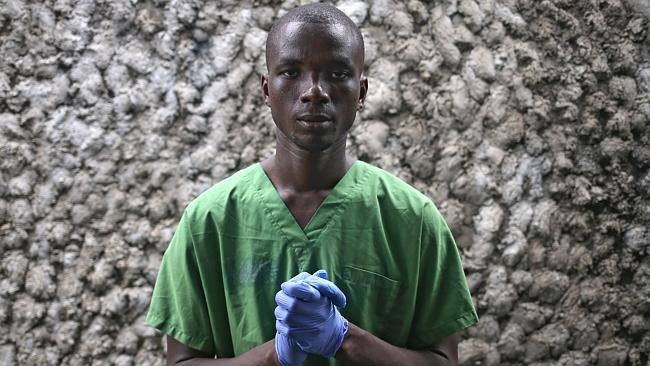
Ebola survivor James Harris, 29, stands for a portrait before a shift as a nurse’s assistant at the Médecins Sans Frontières (MSF), Ebola treatment centre in Paynesville, Liberia. The former construction worker spent two weeks recovering from the disease and now counsels others at the treatment centre. Pic: John Moore/Getty. Source: Getty Images
THERE’S no doubt the world is in the grip of the deadliest Ebola outbreak it’s ever seen.
Around 4500 people have already died with 9000 cases officially recorded across seven countries. The World Health Organisation is warning the virus set for exponential growth with up to 10,000 people infected every week, unless it can be brought under control.
MORE: UN warns 60 days to get disease under control
But while countless communities have been devasted by the epidemic, which just three in every 10 people survive, the reality of life after Ebola can be equally devastating.
A recent survey of 1400 people conducted in Sierra Leone found that 96 per cent reported discrimination against those who had been infected, while 76 per cent said they would shun survivors who tried to return to the community.
MORE: Does Australia have capacity to fight the disease?
Children are particularly vulnerable and the UN estimates 3700 have lost at least one parent to the disease, with anecdotal evidence suggesting they are ostracised and avoided when trying to fend for themselves.
Amid the outbreak in Liberia, Getty photographer John Moore has taken a series of powerful portraits of those who have managed to survive. It’s called The Survivors: Portraits of Liberians who have recovered from Ebola, and you can read their stories below:

Abrahim Quota, 5, lost both parents to Ebola and has been released to live with relatives. Pic: John Moore/Getty Source: Getty Images

Varney Taylor, 26, stands in the low-risk section of the Médecins Sans Frontières treatment centre. He lost three family members to the disease which he believes he contracted after carrying the body of his aunt after she had died. Pic: John Moore/Getty Source: Getty Images

Mohammed Wah, 23, is a construction worker who said Ebola killed five members of his extended family. He thinks he caught the disease, which has a 70 per cent mortality rate, while caring for his nephew. Pic: John Moore/Getty. Source: Getty Images

Benetha Coleman, 24, lost her husband and two children to Ebola. She’s one of the survivors which are left immune to the strain of the disease that sickened them. Pic: John Moore/Getty Source: Getty Images

Mohammed Jan Jallo, 40, is a vendor in an outdoor market and spent nine days in a treatment centre. Pic: John Moore/Getty Source: Getty Images

Jeremra Cooper, 16, wipes his face from the heat inside the Médecins Sans Frontières (MSF), Ebola treatment centre in Liberia. The young student lost six family members to the Ebola epidemic before coming down sick with the disease himself and being sent to the MSF centre, where he recovered after one month. Pic: John Moore/Getty Source: Getty Images

Sontay Massaley, 37, smiles after being released from a treatment centre where she spent eight days recovering. She contracted the virus while working as a market vendor. Pic: John Moore/Getty Source: Getty Images

James Mulbah, 2, stands with his mother, Tamah Mulbah, 28, who also recovered from Ebola. The UN estimates by mid October more than 7400 children will have lost parents to the disease. Pic: John Moore/Getty Source: Getty Images

Eric Forkpa, 23, is a college student majoring in civil engineering who said he thinks he caught Ebola while caring for his sick uncle, who died of the disease. He spent 18 days at the MSF centre recovering. Pic: John Moore/Getty Source: Getty Images

Ami Subah, 39, is a midwife who thinks she caught Ebola when she delivered a baby boy from a sick mother. The boy, she said, survived, but the mother died. She said she has not had work since her recovery, due to the stigma of having had Ebola. “Nobody will even let me draw water from the community well,” she said. Pic: John Moore/Getty Source: Getty Images

Survivors Mark Jerry, 30, (R), and Zaizay Mulbah, 34, stand together before their shifts as nurse’s assistants in Liberia. Jerry was a money changer and Mulbah a delivery driver before they caught the disease and went to the MSF centre where they recovered. MSF hired them afterwards to counsel and comfort others stricken by the disease. Pic: John Moore/Getty Source: Getty Images

Nancy Paye, 20, stands outside the centre where she was treated after she got the disease from a friend, who died in her care. Pic: John Moore/Getty Source: Getty Images

Mohammed Bah, 39, works as a driver and lost his wife, mother, father and sister to the virus. He said he spent a week at the MSF centre recovering from the disease and said the stigma of having had Ebola as been difficult. “I’ve been rejected by everyone. I’m alone with my two children,” he said. Pic: John Moore/Getty Source: Getty Images

Moses Lansanah, 30, is a construction worker who lost his fiance, Amifete, 22, when she was 9 months pregnant with his child, to Ebola. Pic: John Moore/Getty Source: Getty Images
Originally published as What happens to Ebola survivors?
